Srebrenitsa - the inconvenient memory
Adelina Marini, photos: Eva Manasieva, July 13, 2010
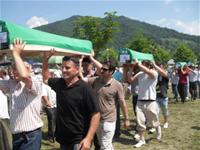 A colleague of mine called me in the middle of last week to tell me that she was being sent to shoot the burial ceremony of over 700 newly identified victims of the Srebrenitsa massacre 15 years ago. She asked me whether I was interested and whether I wanted photos. Of, course, I said - this is a fundamental event. She left for Srebrenitsa on Friday and was calling me every day until Sunday evening when she sent me the photos. In general she is a solid person, she is composed and can hardly be shocked by anything. During the three days she was there she called me at least five times, her voice quivered and she told me that she had never witnessed such a thing before. I will only mention that she works in Austria for a big international news TV.
A colleague of mine called me in the middle of last week to tell me that she was being sent to shoot the burial ceremony of over 700 newly identified victims of the Srebrenitsa massacre 15 years ago. She asked me whether I was interested and whether I wanted photos. Of, course, I said - this is a fundamental event. She left for Srebrenitsa on Friday and was calling me every day until Sunday evening when she sent me the photos. In general she is a solid person, she is composed and can hardly be shocked by anything. During the three days she was there she called me at least five times, her voice quivered and she told me that she had never witnessed such a thing before. I will only mention that she works in Austria for a big international news TV.
I have to admit that I had forgotten the exact date of the massacre and when she called me I started intensively to wait the Bulgarian media to begin warming up for the event from Friday at least. After all, the genocide in Srebrenitsa from 1995 (officially declared as such by the UN) happened only 15 years ago in a neighbouring country. I thought that if euinside had enough funds, we would have been there for certain. I expected the big Bulgarian media, the national ones most of all, would send teams. Well, nothing like this. Yes, on Sunday (the very day of the commemoration) there were reports in Bulgarian media, but they seemed distant like the explosion in Uganda, for example.
And this event should have been a focus because what happened there was not 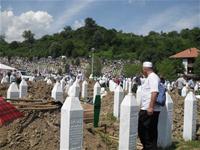 just a war but a genocide. For Europe, which has managed to create something so unique as the European Union with the only purpose to put an end to the horror of wars, the Srebrenitsa genocide must be a shame. This event must be a shame for the US too, who actively participated in the dismantling of former Yugoslavia.
just a war but a genocide. For Europe, which has managed to create something so unique as the European Union with the only purpose to put an end to the horror of wars, the Srebrenitsa genocide must be a shame. This event must be a shame for the US too, who actively participated in the dismantling of former Yugoslavia.
This must be a shame for all Balkan states as well, which did not do enough to prevent what was happening in the neighbourhood.
What happened 15 years ago?
Between seven and eight thousand Muslims were killed as part of an ethnic cleaning by the soldiers of the Bosnian Serbs, led by general Ratko Mladich and under the orders of the former Bosnian President Radovan Karadzhich. After the massacre in Srebrenitsa, the corpses of those killed were buried in mass graves. 15 years later the long and painful procedure of identification of the victims has started in order to help those killed be buried as people.
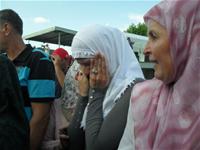 No matter the photos you will see, shot by our colleague Eva Manasieva from Srebrenitsa, you will hardly feel clearly what kind of horror this is. And why?
No matter the photos you will see, shot by our colleague Eva Manasieva from Srebrenitsa, you will hardly feel clearly what kind of horror this is. And why?
There is no answer to this question. Even the War Crimes Tribunal for Former Yugoslavia in the Hague, created by the UN, will not respond to this question. It will only point who is guilty. Currently on trial is only Radovan Karadzhich who was captured after a long time of hiding. And general Mladich is still at large.
Putting him on trial too has been placed as one of the most important precondition by the European Union for the European perspective of the countries in the region. The new American administration of Barack Obama, also called in a special letter, read on his behalf during the commemoration, for the pursue and prosecution of the perpetrators.
But will this lead to reconciliation and to leaving the past rest in peace? 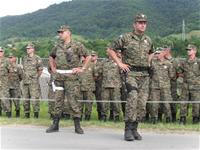 Against the background of what is happening right now in Bosnia and Herzegovina, it is hard to provide an answer. However, a strong signal in this direction is the fact that Serbian President Boris Tadich attended the ceremony, after in March the Serbian Parliament approved a resolution, apologizing for the massacre.
Against the background of what is happening right now in Bosnia and Herzegovina, it is hard to provide an answer. However, a strong signal in this direction is the fact that Serbian President Boris Tadich attended the ceremony, after in March the Serbian Parliament approved a resolution, apologizing for the massacre.
At a political level obviously there is will for looking into the future, among the people, however, hostility remains. About the strong division on the matter also speak the numerous comments in the Internet in Bulgaria too. Many people say that the Srebrenitsa genocide is about to turn into the new European Holocaust, because no one is talking about the Serbian victims of the war.
But no matter which side how many victims had, a major guilt is that it had been allowed in the first place. And this guilt should be shared by all political players at the time, headed by the European Union, the US and the rest of the Balkan countries. We, the ordinary citizens, should also bear responsibility for not exercising enough pressure on our governments the atrocities to stop. Otherwise we will be having the same disputes and will talk about myths on the next anniversary again.
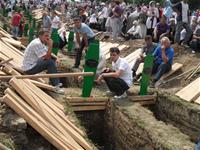 The Srebrenitsa massacre is not a myth - look at the hundreds of coffins! After all, it does not matter what kind of people lie in them - be it Serbs, Muslims or others. The important message is that they are many and had not died from natural causes. And the even more important thing is that this event is still influencing the future of everyone in the region. This is why it had to be a leading topic, so that we could remember. Because when we remember, we learn and when we learn - we build. Just the way the European Union has been established more than 50 years ago.
The Srebrenitsa massacre is not a myth - look at the hundreds of coffins! After all, it does not matter what kind of people lie in them - be it Serbs, Muslims or others. The important message is that they are many and had not died from natural causes. And the even more important thing is that this event is still influencing the future of everyone in the region. This is why it had to be a leading topic, so that we could remember. Because when we remember, we learn and when we learn - we build. Just the way the European Union has been established more than 50 years ago.
 Bakir Izetbegovic, Andrej Plenkovic | © Council of the EU
Bakir Izetbegovic, Andrej Plenkovic | © Council of the EU Aleksandar Vucic, Recep Tayyip Erdogan | © Serbian Presidency
Aleksandar Vucic, Recep Tayyip Erdogan | © Serbian Presidency Jean-Claude Juncker, Zoran Zaev | © European Commission
Jean-Claude Juncker, Zoran Zaev | © European Commission